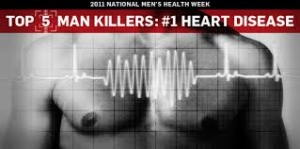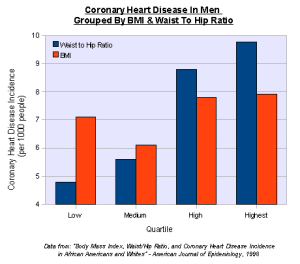The perfect gift this Valentine’s Day is the gift of heart health. Along with Valentine’s Day, February marks American Heart Month, a great time to commit to a healthy lifestyle and make small changes that can lead to a lifetime of heart health.
Heart disease is the leading cause of death for men and women. While Americans of all backgrounds can be at risk for heart disease, African American men, especially those who live in the southeast region of the United States, are at the highest risk for heart disease. Additionally, more than 40 percent of African Americans have high blood pressure, a leading cause of heart disease and stroke. That’s why this February during American Heart Month, Million Hearts is encouraging African American men to take charge of their health and start one new, heart-healthy behavior that can help reduce their risk of heart disease and stroke.
Small Changes Can Make a Big Difference
African American men can make a big difference in their heart health by taking these small steps during the month of February and beyond.
- Schedule a visit with your doctor to talk about heart health. It’s important to schedule regular check-ups even if you think you are not sick. Partner with your doctor and health care team to set goals for improving your heart health, and don’t be afraid to ask questions and trust their advice.
- Add exercise to your daily routine. Start off the month by walking 15 minutes, 3 times each week. By mid-month, increase your time to 30 minutes, 3 times each week.
- Increase healthy eating. Cook heart-healthy meals at home at least 3 times each week and make your favorite recipe lower sodium. For example, swap out salt for fresh or dried herbs and spices.
- Take steps to quit smoking. If you currently smoke, quitting can cut your risk for heart disease and stroke. Learn more a CDC’s Smoking and Tobacco Use website or the AHA.
- Take medication as prescribed. Talk with your doctor about the importance of high blood pressure and cholesterol medications. If you’re having trouble taking your medicines on time or if you’re having side effects, ask your doctor for help.Heart disease is one of the leading health risks facing men today. According to the American Heart Association (AHA), more than one in three adult men has heart disease. Although it may seem that something so serious should have warning signs, you may be developing heart disease without knowing it as you go about your daily life. Know the early signs of heart disease — as well as risk factors — so you can get treatment early and prevent more serious health problems.The risk factors:Risk factors include:
- Many men are at high risk for developing heart disease. The AHA reports that only a quarter of men met federal guidelines for physical activity in 2011. In 2015, an estimated 205 million U.S. men were obese. And about 20 percent of men smoke, which can cause the blood vessels to narrow. Narrowed blood vessels are a precursor to certain types of heart disease.
- Heart disease is an umbrella term that includes heart failure, coronary artery disease, arrhythmias, angina, and other heart-related infections, irregularities, and birth defects.
- Heart Disease
- a diet high in saturated fat
- alcohol abuse or excessive drinking
- high cholesterol
- diabetes
- high blood pressure (hypertension)Early Signs of Heart DiseaseIn the early stages, symptoms that seem like mere annoyances may come and go. For example, you may have heart arrhythmias, which can cause:
- The first sign of heart disease is often a heart attack or other serious event. But, there are a few important signs that can help you recognize problems before they come to a head.
- According to the Centers for Disease Control and Prevention (CDC), nearly half of all Americans — both men and women — have three or more risk factors for heart disease.
- difficulty catching your breath after moderate physical exertion, like walking up a flight of stairs
- a sense of discomfort or squeezing in your chest that lasts for 30 minutes to a few hours
- unexplained pain in your upper torso, neck, and jaw
- a heartbeat that is faster or slower than usual
- dizziness or fainting
- Heart disease that involves your blood vessels is often signaled by:
- chest pain (angina)
- shortness of breath
- changes in your extremities, such as pain, swelling, tingling, numbness, coldness, and weakness
- extreme fatigue
- irregular heartbeatIn addition to the above symptoms, heart disease caused by an infection of the heart can include dry cough, fever, and skin rashes. * *After undergoing triple coronary bypass surgery in 1999, Louisiana native, Clarence Ancar made the decision to make his heart health a priority. Before he had surgery, Clarence knew he had high cholesterol but had dismissed his doctor’s advice on adopting a healthy lifestyle and taking his medication. Clarence’s cardiologist, Dr. Keith C. Ferdinand, taught him that heart disease was not a death sentence and that he could still live a long, healthy life if he committed to making a few changes and respected his heart condition. Working together with his health care team, Clarence developed a plan to start and stay heart healthy. By setting small, achievable goals and tracking those goals, Clarence made a big and lasting difference in his health. He learned the importance of taking his high blood pressure and cholesterol medications. With the help of a dietitian Dr. Ferdinand referred him to, he started eating less of the fatty, salty, and greasy food and added more fruits and vegetables. He also began walking 2-3 miles each day. After his surgery, Clarence lost a significant amount of weight and kept it off. Today, Dr. Ferdinand continues to motivate and support Clarence in his heart health journey. By having a strong and trusting relationship with his doctor, Clarence was able to adopt and maintain a healthy lifestyle. Clarence encourages African American men to be strong and commit to making one heart-healthy lifestyle change during American Heart Month. *
Strong Men Make Heart Health a Priority
A cluster of risk factors may also signal impending heart disease. For example, your risk of heart disease significantly increases if you have diabetes and high blood pressure. These can be signs that your blood vessels have narrowed. This narrowing, which can be caused by plaque build-up, makes it more difficult for your heart to pump and circulate oxygenated blood efficiently through your body.

